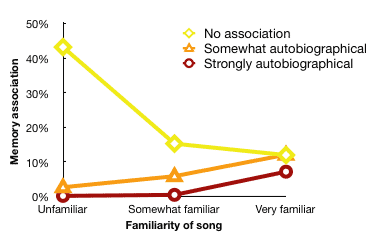"What seems to happen is that a piece of familiar music serves as a soundtrack for a mental movie that starts playing in our head. It calls back memories of a particular person or place, and you might all of a sudden see that person's face in your mind's eye."
Janata conducted an experiment that measured activity in the brain as subjects listened to 30 different songs that were randomly chosen from the Billboard Top 100 from the years the subjects would have been 8 to 18 years old. In addition to monitoring the brain activity, Janata had the subjects raise their hands when the song specifically triggered an autobiographical memory instead. The part of the brain that was affected by this experiment was the medial prefrontal cortex. It responded quickest to music signature, timescale and tonality but reacted more powerfully when the song triggered an autobiographical memory.
Here is an image of some of the brain scans done from this experiment:
 |
Brain areas showing music tonality-tracking behavior. Different colors represent the
number of subjects who showed significant tracking behavior.
Source: Cerebral Cortex/Janata, no date
|
I also found this graph explaining some of the results of Janata's experiment:
 |
| Graph of Memory Association and Familiarity of Song Source: Petr Janata, no date Retrieved from: http://scienceblogs.com/cognitivedaily/2008/08/18/ music-and-memory-1/, accessed 3 Dec 2012. |
Honestly, I found this graph a bit confusing but luckily found a good explanation of how to interpret it. Dave Munger, a blogger on ScienceBlogs.com, commented about this graph:
"'Memory association' indicates the percentage of listeners indicating that they had a particular type of memory associated with a song. 'No association' means they had no memory to go with the song. So nearly all listeners had no memories associated with unfamiliar songs, but when the songs were very familiar, most listeners had either strong autobiographical or somewhat autobiographical memories associated with those songs."
Bringing it back to the research of how music helps those suffering from Alzheimer's, Janata stated that, "It's not going to reverse the disease, but if you can make quality of life better, why not?" I agree with Janata. Obviously music won't cure Alzheimer's but if it can significantly increase the quality of life of those who suffer from it, then I feel that more effort should be made in helping those individuals gain access to music.
You can find the entire case study of Janata's research here (for a price):
"Characterisation of music-evoked autobiographical memories" on Taylor & Francis Online
There is also another fascinating study done on the correlation between music and autobiographical memory found here (without a price):
"Remembrance of Things Past: Music, Autobiographical Memory, and Emotion" on ACRwebsite.org
No comments:
Post a Comment